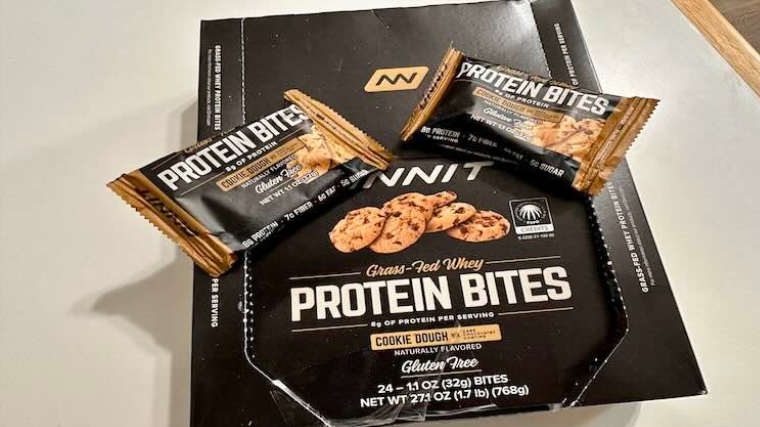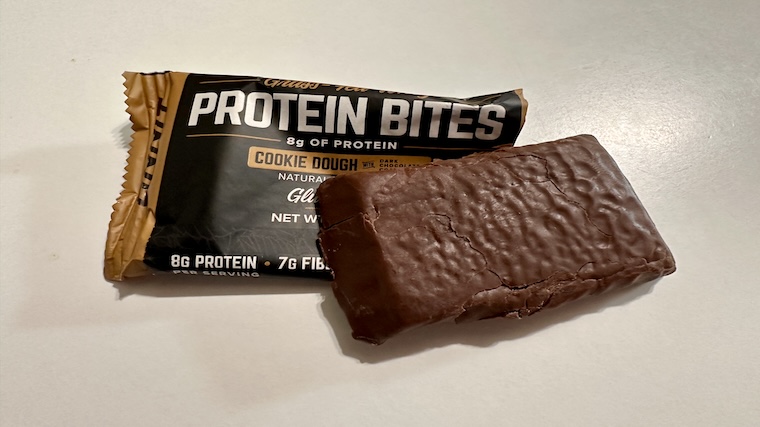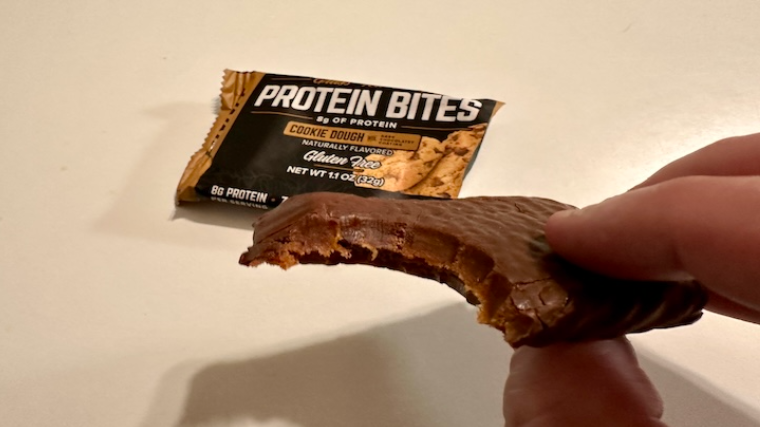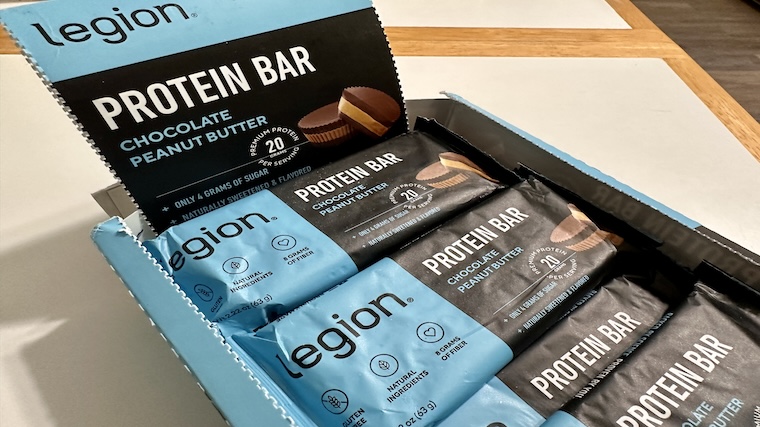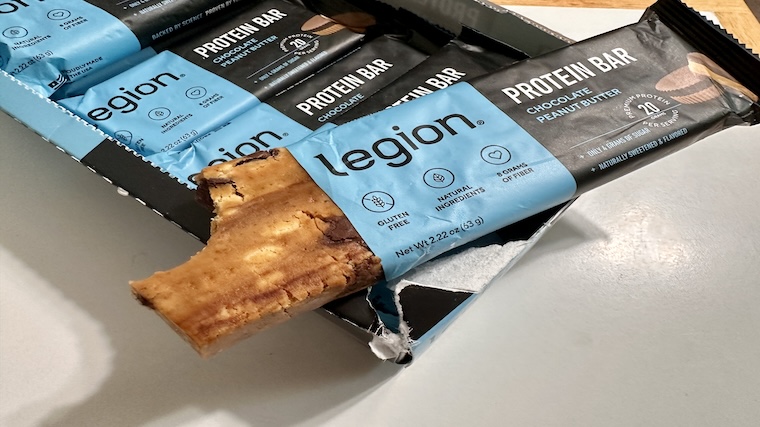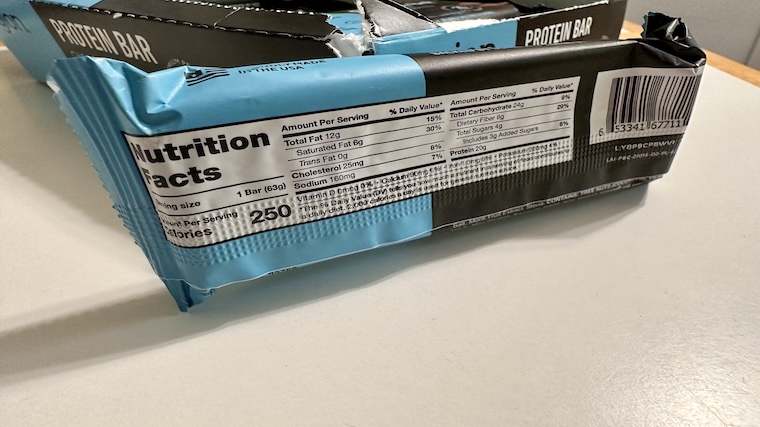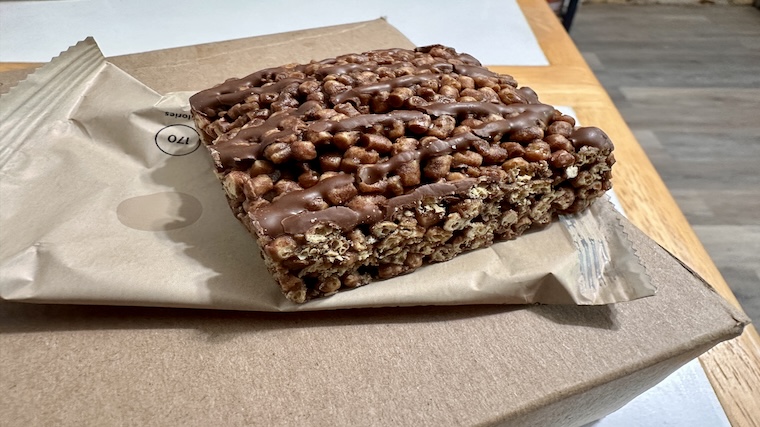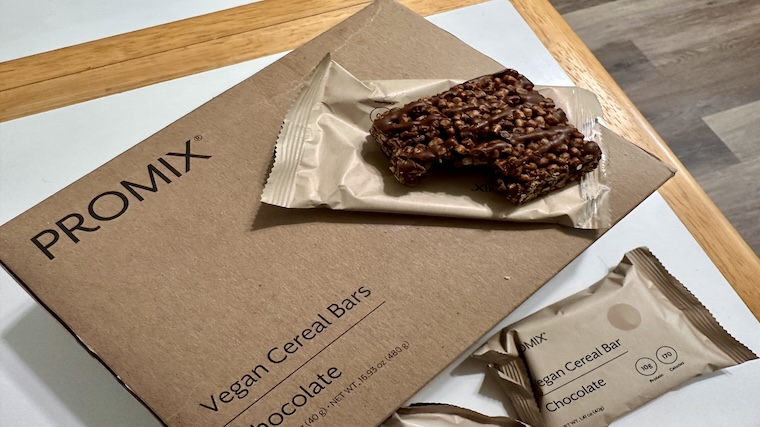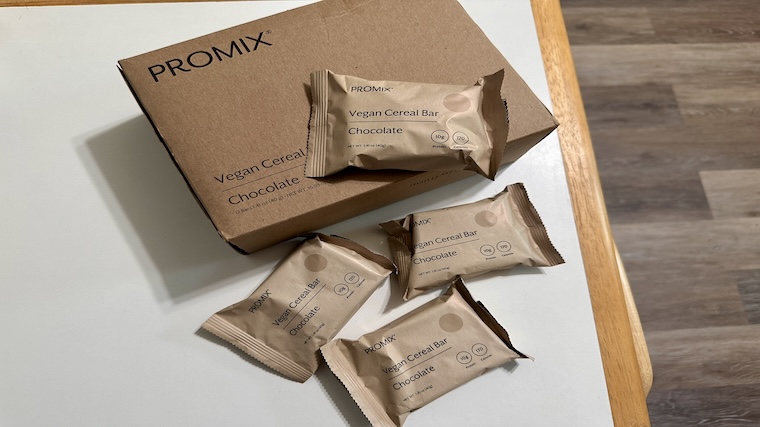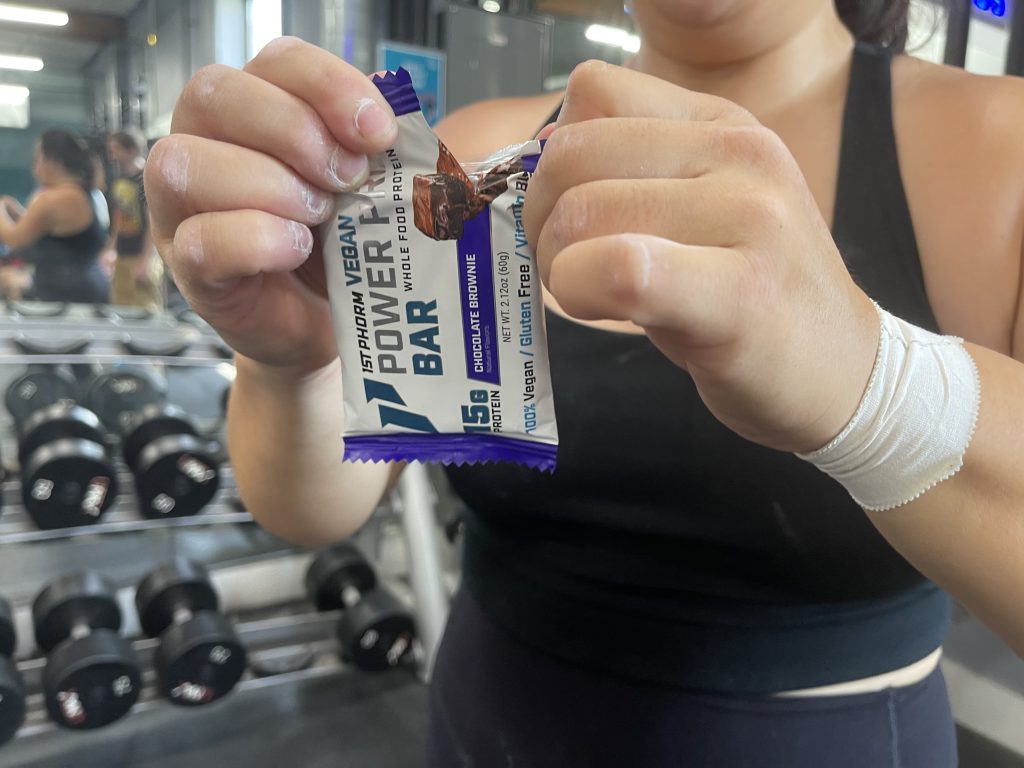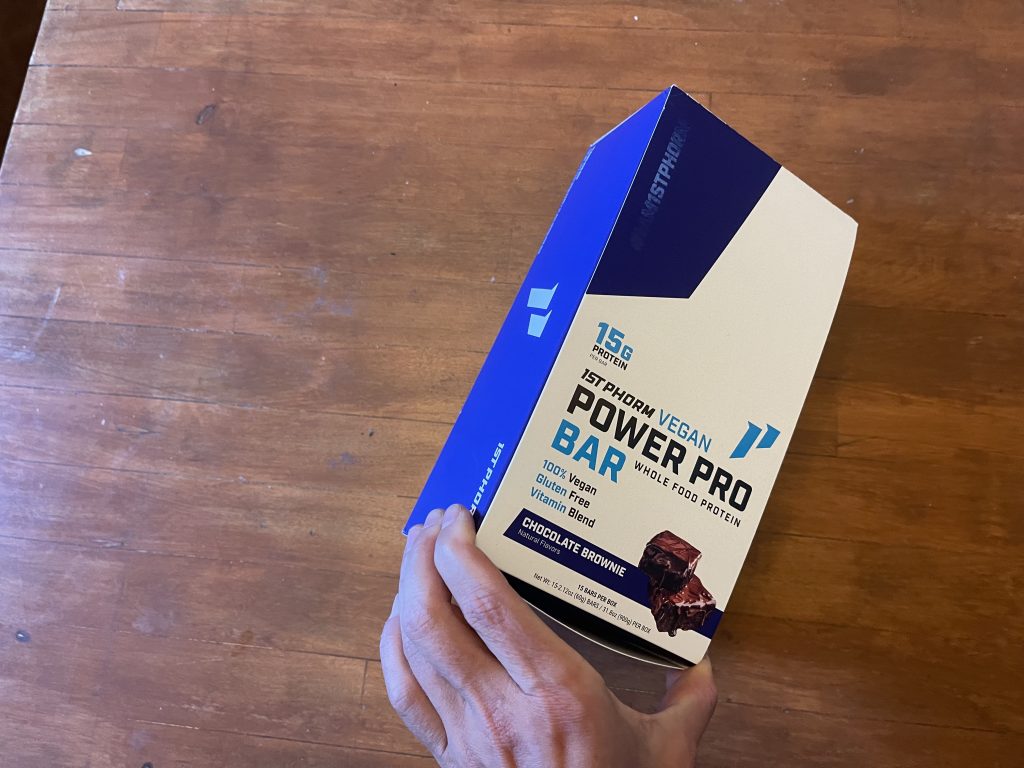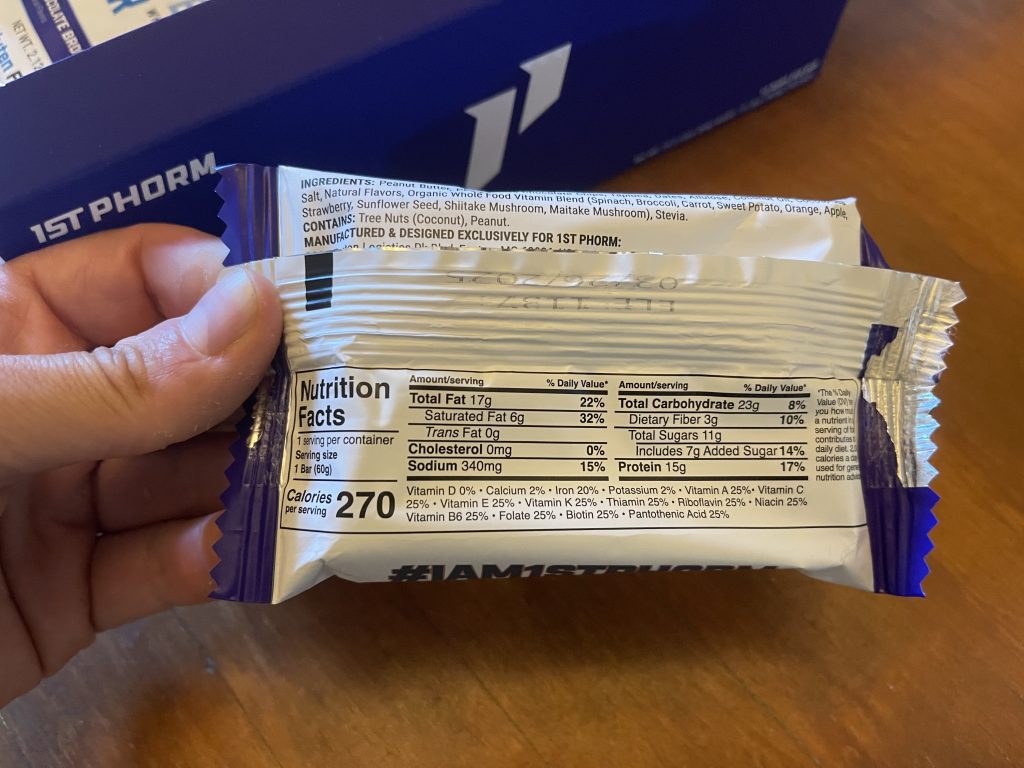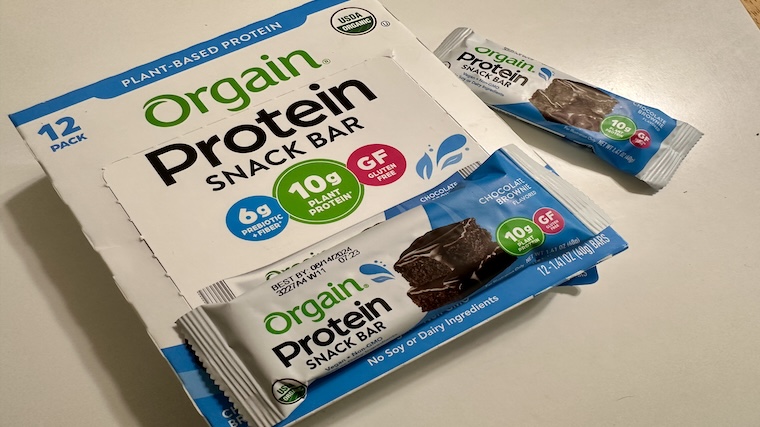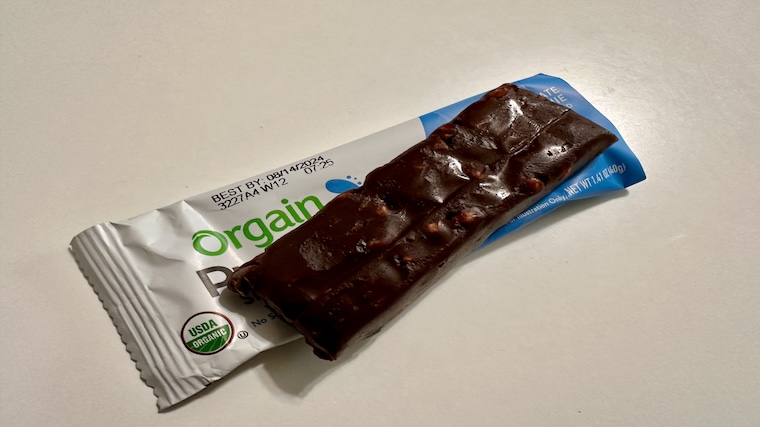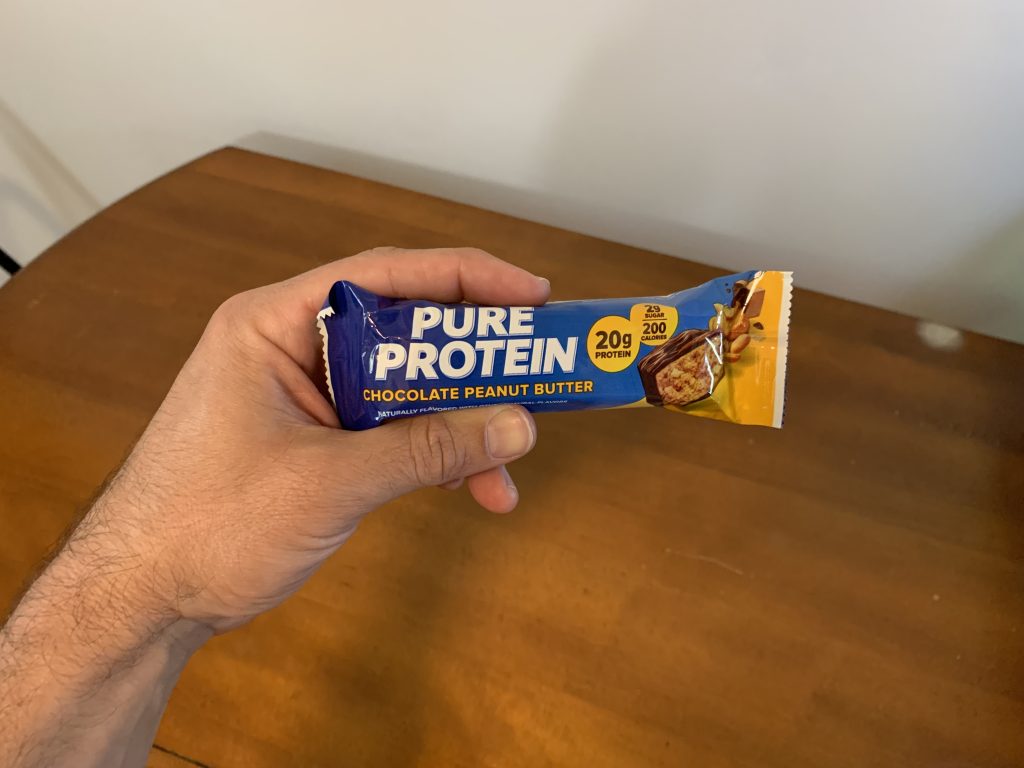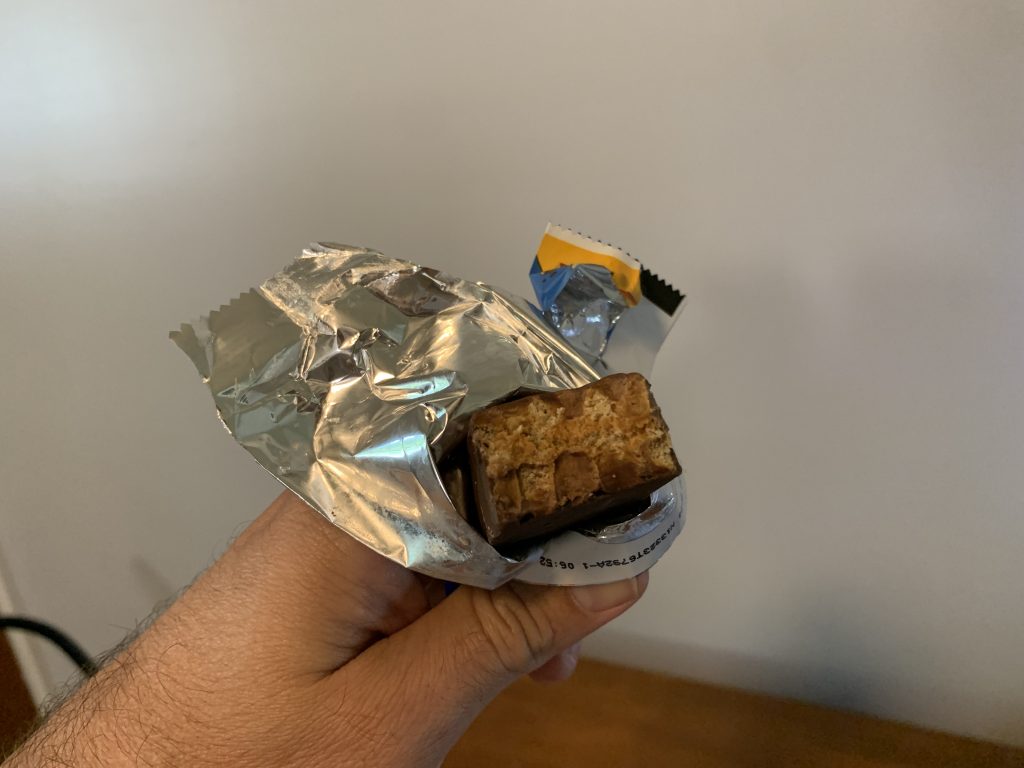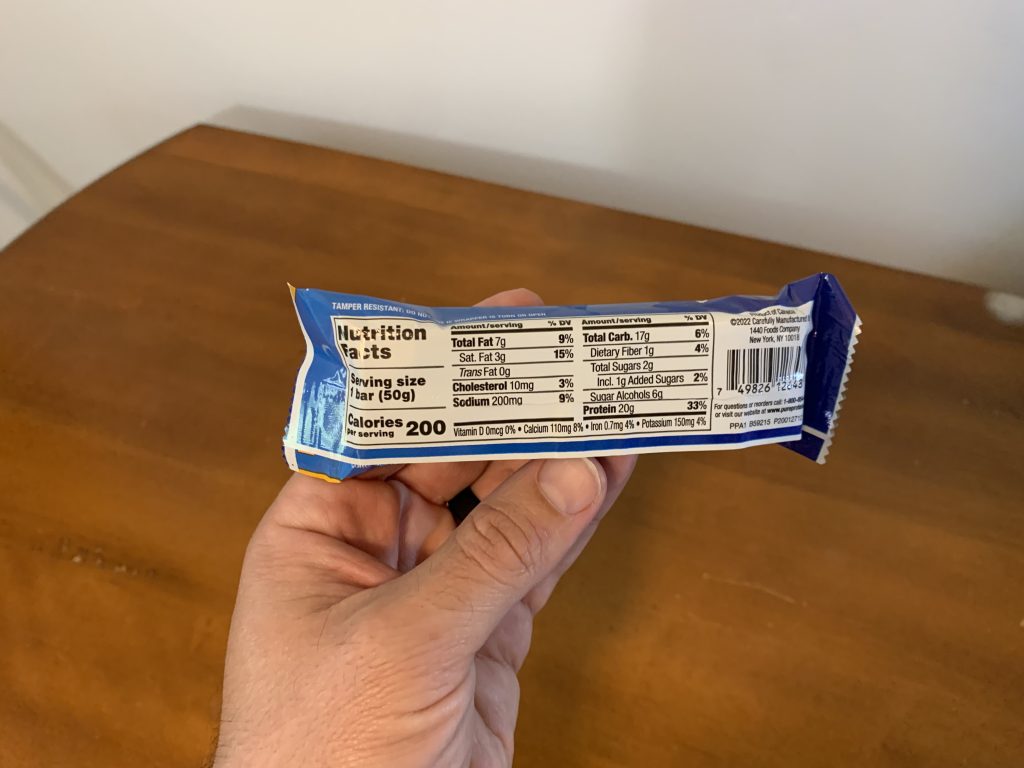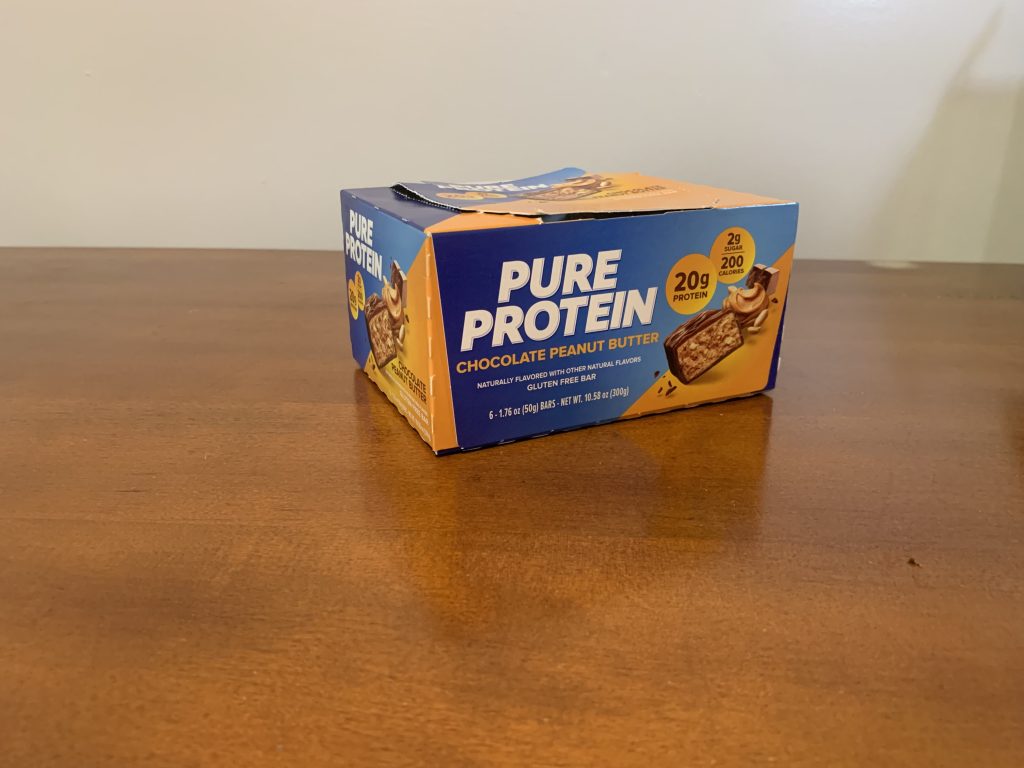A hearty protein powder can help you hit your protein goals, but making a shake or toting around a shaker bottle isn’t always feasible. Protein bars can be worthwhile alternatives for those needing a quick fix of muscle-boosting macros. Additionally, the best protein bars can be your secret weapon for maintaining healthy amino acid levels and keeping hunger at bay between meals.
Take a look online, at your local supplements store, or even at the gas station, however, and you’ll soon realize that there’s practically no end to the assortment of protein bars available to athletes. To narrow down your search efforts, we took a deep dive into the category by personally testing 46 different bars, conducting mounds of research, and consulting with customer reviews. After weeks of testing (and plenty of wrappers discarded) we’ve landed on the best protein bars available today.
The 10 Best Protein Bars of 2024
- Best Protein Bar Overall: Transparent Labs Protein+ Bar
- Best Tasting Protein Bar: Onnit Protein Bites
- Best Protein Bar for Muscle Gain: Legion High-Protein Bar
- Best Crunchy Protein Bar: Promix Crunchy Puff Bar
- Best Natural Protein Bar: 1st Phorm Vegan Power Pro Bar
- Best Protein Bar for Weight Loss: Bulletproof Protein Crisp Bar
- Best Vegan Protein Bar: Orgain Protein Snack Bar
- Best Protein Bar for Keto: Nick’s Keto Snack Bar
- Best Budget Protein Bar: Pure Protein Bars
- Best Low-Carb Protein Bar: EPIC Protein Bars
Editor’s note: The content on BarBend is meant to be informative in nature, but it should not be taken as medical advice. The opinions and articles on this site are not intended for use as diagnosis, prevention, and/or treatment of health problems. It’s always a good idea to talk to your doctor before beginning a new fitness, nutritional, and/or supplement routine. Individual needs for vitamins and minerals will vary.
Best Protein Bars Video Review
Check out our best protein bars round-up video for an up-close and personal look at some of the picks on our list. BarBend‘s Nick English walks you through the makeups of our favorite macro-rich snacks, offering some expert insight along the way on what you may like or dislike about them depending on your training goals and nutritional needs.
How We Chose and Tested the Best Protein Bars
The BarBend team is made up of competitive athletes, certified personal trainers, and lifelong fitness enthusiasts. We’re constantly looking to boost our nutrition and performance, so protein bars have been a common placeholder for us within our respective diets.
Using our supplement testing methodology, we considered and tested more than 10 different protein bars to gather the best of the best. Here are the factors we considered during our testing.
Macronutrients
We’re recreational strength athletes that are always on the lookout for the optimal snack to power us through workouts, work, and our day-to-day activities. A great protein bar will have macronutrients that promote muscle recovery and satiation while also sometimes keeping calories on the lower end of the spectrum.
Additionally, we understand that different athletes have different needs and wants when it comes to nutrition. So, while our testing primarily focused on the protein dosages of each bar, we included our findings as they related to carb and fat totals, too. We searched for options containing at least seven grams of protein, and highlighted higher totals as good picks for goals such as muscle gain or post-workout recovery.
Calories Per Bar
There’s no denying that protein bars aren’t the lowest calorie snacks on the market. That said, we looked for bars ranging in calories in an effort to give you a variety of options suitable for different needs.
In testing, we found options between 120 and 250 calories per bar. Lower-calorie bars were included for snacking and weight loss needs, while those with higher counts served as solid options for weight gain and meal replacement.
Taste and Experience
Taste can be a subjective term for most, but we looked for protein bars that appealed to our palettes, as you’d likely expect. We included our notes on flavors, as we feel you’re likely to opt for a pick if you know others enjoy the taste. Additionally, we searched for protein bars offering some sense of variety in flavors. While many of our included profiles showcased a chocolate-rich variety, we also featured a handful offering more fruit-based options like blueberry or lemon.
As far as experiences go, we didn’t have any issues regarding digestion or post-consumption distress with any of our included protein bars. So, we instead honed in on how easily the bars were to eat. If we had to really chew through a dense makeup, we highlighted that experience in our notes above. If a profile was soft and delectable, those points also made their way into our guide.
Price
Protein bars should easily fit within your budget as a nice snack or quick alternative to a meal when in a pinch. We searched for bars and bites at a variety of price points, with many coming in between $1.50 and $3.50 per serving. We were able to find respectable protein and calorie counts at all price points, but we did notice that bars containing particularly high doses of protein typically cost more.
We attribute this price increase to the added calories, as well, and why we recommended such profiles for meal replacement and occasional snacking over daily satiation.
Best Protein Bar Overall: Transparent Labs Protein+ Bar
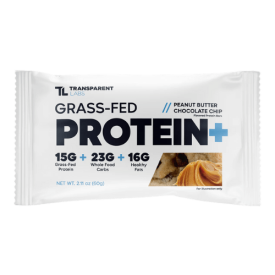
Among our favorite protein bars, the Transparent Labs Protein+ Bar packs plenty of protein per serving and uses only grass-fed whey, alongside other clean ingredients.
Specs
- Price Per Bar: $3.33
- Protein Source: Grass-fed whey
- Protein per Serving: 15 grams
- Calories per Serving: 280 calories
- Available Flavors: Peanut Butter Chocolate Chip
Pros
- These bars pack 15 grams of grass-fed whey protein per serving with no artificial ingredients.
- TL uses dates and honey to sweeten this product.
- One bar has 280 calories and balanced macros, ideal for a post-workout snack.
Cons
- You can find protein bars with higher protein content per serving.
- You can only buy these in a box of 12, not as individual bars.
There are a few must-have factors we considered for the best protein bar: protein content, clean ingredients, and a delicious flavor. Transparent Labs Protein+ Bar ticks all those boxes and more. One bar packs 15 grams of grass-fed whey protein with no artificial sugars or flavors, earning the formula a 4.5 out of 5 rating.
Whereas many protein bars use sucralose or other artificial sugars as sweeteners, Transparent Labs includes honey and dates as sweetening agents. We also like that the macros are pretty balanced, including 16 grams of fat, 23 grams of carbs, and 15 grams of protein.
“These bars genuinely taste like peanut butter and chocolate. The chocolate pieces melt in your mouth,” according to our tester, who gave the flavor a 4 out of 5. “Unlike some other protein bars, they don’t taste chalky. I’m not a huge protein bar person, but I could totally foresee myself keeping these around for rushed days.”
We were also pretty impressed by the texture, giving this category a 4 out of 5, too. Our testers found that they were a little bit dry but the dates definitely helped make the bars soft and chewy. Not to mention, the real pieces of chocolate were absolutely delicious.
One downside, for some athletes, may be the fat content in these bars. Higher fat content isn’t necessarily a bad thing but it may not fit everyone’s dietary regimen. “These are pretty dense and they’re not low fat at all,” our tester said. “But the formula is clean, which is a big selling point for me.”
Unfortunately, Transparent Labs’ protein bars aren’t the most budget-friendly pick on our list. One box of 12 bars costs $39.99, which is about $3.33 per bar. We gave this product a 3 out of 5 for cost, as most of our other picks cost less than $3 per bar.
[Related: Pretty Close to Perfect Protein Bars From Your Own Kitchen]
Best Tasting Protein Bar: Onnit Protein Bites
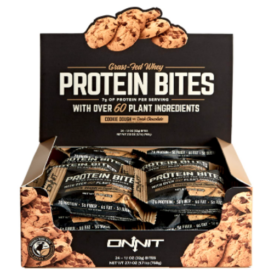
Onnit’s protein bites combine the decadence of a dark chocolate coating with a great tasting center, available in three delicious flavors — Chocolate Cookie Dough, Chocolate Coconut Cashew, and Chocolate Peanut Butter. These bites contain up to 9g of grass-fed whey isolate, and 7g of dietary fiber.
Specs
- Price Per Bar: $1.66
- Protein Source: Whey Protein, Milk Protein Isolate
- Protein per Serving: 7-9 grams
- Calories per Serving: 120-150 calories
- Available Flavors: Cookies and Cream, S’mores, Chocolate Coconut Cashew, Chocolate Cookie Dough, Chocolate Peanut Butter
Pros
- Our tester noted that every flavor is delicious, even comparing them to their favorite candy bars.
- These bars contain between 120 and 150 calories per serving — perfect for weight loss journeys.
- This product is gluten-free for those who have gluten sensitivity.
Cons
- The bars only contain between seven and nine grams of protein per serving.
- The calorie count is lower than other bars in this round-up.
- Sensitive athletes may want to forgo this option, since it contains tree nuts, soy, and other allergens.
Your protein snack should be enjoyable, so you are actually looking forward to meeting your protein intake. Onnit’s Protein Bites are almost scarily good — our tester commented that eating one of these bars is like enjoying your favorite candy bar. “The Cookies & Cream flavor is unbelievable,” they said, giving the flavor a 5 out of 5. “It tastes like a real Oreo cookie.”
Despite their enticing sweetness, Onnit’s Protein Bites contain between five and seven grams of sugar while also delivering between seven and nine grams of a protein blend containing whey protein and milk protein isolate. They also pack seven grams of fiber per serving, which we loved.
“The ingredients are listed by weight in descending order, so it’s telling that whey protein isn’t first on this product’s ingredient list,” according to Chelsea Rae Bourgeois, RDN, who gave the formula a 3 out of 5. “I wish there was a bit more protein per serving and better use of natural sweeteners.”
“These bites are really chewy and have plenty of moisture,” our tester said, giving the texture a perfect 5 out of 5 score. “You don’t get any of the dryness you’ll usually experience with the average protein bar.”
There’s also the budget-friendly price point that gives these protein bars the edge over other options we tested. The Cookies and Cream, S’mores, Chocolate Coconut Cashew, Chocolate Cookie Dough, and Chocolate Peanut Butter offerings come in boxes of 24 for roughly $40. That equates to just $1.66 per bar. That’s well below the average $2.88 price of a chocolate bar, with the added perks of worthwhile macronutrients. (8)
These products are also gluten-free, but they do contain tree nuts, milk, soy, and sesame. As a result, these may not work for all athletes. Otherwise, these are among the tastiest, best pre-workout snacks you can have in your gym bag.
Best Protein Bar for Muscle Gain: Legion High-Protein Bar
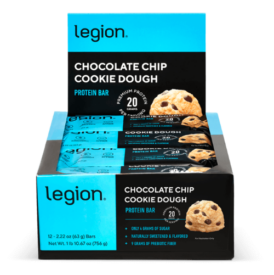
Legion High-Protein Bar has 20g of protein, 24g of carbs, and 12 grams of fat per bar. It slots in at 240 calories, and there’s only 4g of sugar per bar, which is pretty low considering some bars have up to 20g. Plus, the protein comes from a combination of whey protein isolate and whey protein concentrate, which makes for a balanced, stable blend.
Specs
- Price Per Bar: $3.33
- Protein Source: Whey Isolate, Whey Hydrolysate, Whey Concentrate
- Protein per Serving: 20 grams
- Calories per Serving: 240-250 calories
- Available Flavors: Chocolate Peanut Butter, Blueberry Muffin, Chocolate Chip Cookie Dough, Peanut Butter Jelly, S’mores
Pros
- These pack 20 grams of protein per serving, ideal for athletes looking to gain muscle.
- These bars are free of sugar alcohols, gluten, and artificial sweeteners.
- The 240 to 250 calories per bar can be great for a meal alternative.
Cons
- Our tester noted that the bars are drier than expected and take a while to chew.
- These bars contain 24 to 38 grams of carbs, which may be too high for low-carb diets.
- There’s no option to subscribe for repeat orders and lower price points.
For athletes looking to gain muscle, we highly recommend Legion’s High-Protein Bar. Each bar comes with 20 grams of a protein blend containing whey isolate, whey hydrolysate, and whey concentrate, as well as 240 to 250 calories. That’s enough for a perfect post-workout supplement.
We also liked how Legion keeps these bars well-rounded, giving the formulation a 4.5 out of 5. The ingredients are clean, including six to 12 grams of fat, 24 to 38 grams of carbohydrates, and a makeup that’s free of any sugar alcohols, gluten, or artificial sweeteners. “Legion High Protein Bars score 4 out of 5 for their formulation, with deductions for the erythritol, added sugar, and fat content,” Chelsea Rae Bourgeois, RDN, said.
“The Chocolate Peanut Butter was very chocolate-focused,” our tester said, giving the flavor a 3.5 out of 5. “I didn’t get as much peanut butter taste as I would have liked — I only really noticed it in the aftertaste.” Nevertheless, if you’re a chocolate fan, our tester compared this one to a Hershey’s Kiss.
Considering the amount of protein per bar, the texture isn’t the best. “This protein bar is pretty dense and hard to bite,” our tester said, giving the texture a 3 out of 5. “This could be tough for people with sensitive teeth to bite into.” For those who prefer a chewier option, we recommend one of our other picks.
That being said, this bar does pack a lot of protein, which is great for athletes who want to swap out their protein shake. This product is pretty pricey at $3.33 per bar but considering the protein density, we gave the overall value a 4 out of 5.
Best Crunchy Protein Bar: Promix Crunchy Puff Bar
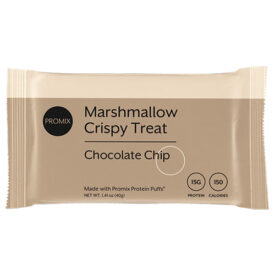
These crunchy bars are reminiscent of a rice crispy treat that's packed with protein and absent all that unwanted sugar. They're a nice change from normal chewy protein bars.
Specs
- Price Per Bar: $2.67
- Protein Source: Whey Protein Isolate, Whey Protein Concentrate
- Protein per Serving: 14-15 grams
- Calories per Serving: 150-160 calories
- Available Flavors: Vanilla, Snickerdoodle, Chocolate Chip, Mint Chocolate, Blueberries and Cream, Strawberries and Cream, Variety Pack
Pros
- The “puffs” of this protein bar give it a unique, crunchy texture, similar to a Rice Krispies Treat.
- Promix’s bars come in six great flavors.
- These are third-party tested, so you get all-natural ingredients and transparency.
Cons
- The 14 to 15 grams of protein per serving is lower than others in this guide.
- Anyone who is allergic to or doesn’t like marshmallows should avoid this product.
Texture is a big part of what makes food enjoyable. If you’re tired of the same old grainy protein bar texture, you might want to pick up one of these snacks that are more like a rice treat. After giving it a try, our testers gave this product a 4.5 out of 5 for texture.
We also liked the ingredients in the formula. Promix features whole food ingredients and third-party testing results available to view for each product. However, we do wish the macros were more balanced. “You get a nice helping of protein per serving, but it is fairly low in carbs and fat,” according to Chelsea Rae Bourgeois, RDN, who rated the formula a 4 out of 5. “I like it when supplements stay true to their name and serve as a supplemental boost to a well-balanced diet.”
Our tester appreciated the flavor profile of these unique protein snacks, which they noted as light and not too rich. “I enjoyed trying the chocolate flavor,” according to our tester, who gave the taste a 5 out of 5. “It was just like a chocolate Rice Krispies treat.”
These aren’t enough to qualify as the best meal replacement, so if that’s what you’re looking for, you may want a different bar. Nevertheless, our team found these pretty filling. “Having one of these bars was pretty satisfying,” our tester said, giving the effects a 4 out of 5.
The price is also approachable at $2.67 per serving, albeit slightly higher than some protein bars we included in this round-up, earning a 4 out of 5 for cost. For the uniqueness and interesting makeup, though, we’re willing to pay the extra coin and get a nice dose of nostalgia along with our daily macros.
Best Natural Protein Bar: 1st Phorm Vegan Power Pro Bar
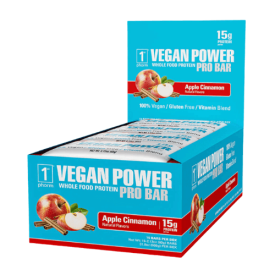
For those following a plant-based diet, 1st Phorm has you covered. These bars are completely vegan-friendly and they pack 15 grams of protein per serving, ideal for a post-workout snack.
Specs
- Price Per Bar: $2.86
- Protein Source: Pea Protein
- Protein per Serving: 15 grams
- Calories per Serving: 270 calories
- Available Flavors: Apple Cinnamon, Banana Nut Bread, Chocolate Brownie, Chocolate Mint Cookie
Pros
- These protein bars have only natural, whole ingredients.
- At only $2.86 per bar, these are pretty budget-friendly.
- For a plant-based bar, you still get ample protein per serving.
Cons
- Other whey-based bars have higher protein content per serving.
- This formula contains peanuts, which is crucial to know for folks with allergies.
Protein bars can be filled with processed, artificial ingredients but that’s not the case with 1st Phorm’s Vegan Power Pro Bar. Among the best vegan protein supplements, this pick uses all natural, whole ingredients, even sweetening the formula with stevia (not an artificial sugar), which is why our team gave the ingredients a 5 out of 5.
Our team has to admit, though, we weren’t huge fans of the flavor. “The flavor was not great,” our tester said, giving the taste a 3 out of 5. “You could definitely tell that they’re vegan — both flavors I bought tasted earthy. “
The texture was also more dry than we would have liked. These bars are pretty dense, too, which (paired with the dryness) makes them difficult to chew. “These even look dry when you bite into them,” our tester said, giving the texture a 2 out of 5.
Aside from the texture, though, our tester didn’t notice any negative side effects, aside from some annoying mouth dryness. So, it’s probably best if you eat these with a water bottle nearby.
Price-wise, Legion’s bars are pretty approachable, earning a 4 out of 5 for cost. One 15-bar box costs $42.99, which is about $2.86 per bar. And you can even subscribe to monthly deliveries and save money.
Best Protein Bar for Weight Loss: Bulletproof Protein Crisp Bar
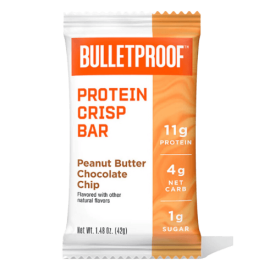
Bulletproof's Protein Crisp Bars are extremely calorie-friendly, making them an easy addition into any weight-loss or fat-loss diet. We also love the clean, whole food ingredients.
Specs
- Price Per Bar: $2.99
- Protein Source: Pea Protein
- Protein per Serving: 11 grams
- Calories per Serving: 160 calories
- Available Flavors: Peanut Butter Chocolate Chip, Coconut Chocolate Chip, Salted Caramel, Chocolate Mint Chip
Pros
- This bar is only 160 calories, making it easy to fit into most weight-loss diets.
- One serving packs nine grams of fiber, which is 32 percent of your daily value.
- Bulletproof uses stevia to sweeten, as opposed to artificial sugars.
Cons
- You only get 11 grams of protein per serving, which is on the lower end.
- There are cheaper options on this list
Having a low-calorie protein bar in your snack cabinet is a great way to stick to your weight-loss plan while enjoying a delicious, filling treat. For those looking to lose weight, we recommend Bulletproof’s Protein Crisp Bar.
We like that this bar has zero artificial sweeteners and it’s completely gluten-free, dairy-free, and keto-friendly. It also contains stevia and monk fruit extract as sweetening agents, which most people probably prefer to artificial sugars. However, these do contain peanuts and almonds, which may not work with everyone. We also wish they were a little more protein dense.
“These protein bars provide more calories from fat than protein,” Chelsea Rae Bourgeois, RDN, says, rating the formula a 3 out of 5. “As these are considered a protein supplement, I would have expected more emphasis on protein.”
Our tester tried the Peanut Butter Chocolate Chip and gave it a 4 out of 5 rating. “The peanut butter is definitely prevalent in this bar with a little chocolate,” they said. “You definitely get all the flavors but without the fat and sugar of a candy bar.”
The texture in the name is a little misleading, though, our team thought. Although this protein bar is advertised as being crisp, it’s much more chewy, which we actually liked, giving the texture a 4 out of 5. This isn’t the crunchiest or crispiest, so for athletes looking for that mouthfeel, another product is probably best.
Bulletproof’s protein bars earned a 4 out of 5 for cost, as they’re about $2.99 per bar. This isn’t the most expensive product on this list but you can still find cheaper options. We do like that you can subscribe to recurring deliveries for 20 percent off, though.
Best Vegan Protein Bars: Orgain Protein Snack Bar
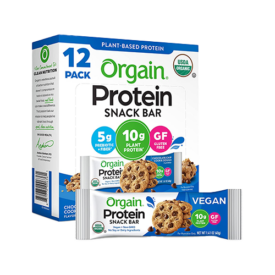
Orgain Protein Snack Bars are a great on-the-go snack that provides a hit of protein. They’re also helpful as a quick post-workout snack. Each bar has 10g of vegan protein sourced from rice and peas as well as low sugar with no artificial flavors or preservatives.
Specs
- Price Per Bar: $1.99
- Protein Source: Brown rice protein, pea protein
- Protein per Serving: 10 grams
- Calories per Serving: 150
- Available Flavors: Peanut Butter Chocolate Chunk, Chocolate Brownie, Chocolate Chip Cookie Dough, Chocolate Coconut, Peanut Butter, S’mores
Pros
- The bars are 100 percent plant-based with protein sourced from peas and brown rice.
- These are only 150 calories per serving, which is helpful for those on a calorie deficit.
- At $1.99 per bar, these are pretty budget-friendly.
Cons
- Other options have higher protein content, but they’re not necessarily vegan-friendly.
- These don’t have much fiber (one gram), which you’d expect to see with a plant-based bar.
While most protein bars on the market contain whey, that’s certainly not the case for Orgain’s Protein Snack Bar. These are completely vegan-friendly with zero animal-based ingredients. You also get 10 grams of plant protein per serving from brown rice and peas.
This product is certified plant based, so those following a vegan diet can eat these in confidence. We do wish the formula contained a little more protein, though, as one serving only provides 10 grams. “The protein content is pretty modest compared to the rest of the market, and the added sugar and sugar alcohol content may not be ideal for everyone,” according to Chelsea Rae Bourgeois, RDN, who rated the formula a 3.5 out of 5.
“These taste really good, especially for a plant-based protein bar,” our tester said, giving the flavor a 5 out of 5. “I ate the Chocolate Chip Cookie Dough and it didn’t taste too earthy like some other plant-based protein bars.”
We also liked the texture more than some of the other bars we’ve tried, giving this category a 5 out of 5. “The texture actually reminded me of cookie dough,” our tester said. “It was soft and chewy, definitely matching the flavor description.”
Where negative side effects are concerned, we did notice a little mouth dryness but this wasn’t a deal breaker for our testers. “I was surprised by how much I enjoyed this bar, though you do get a little bit of an aftertaste due to the artificial ingredients, like erythritol,” our tester said. Those who don’t love artificial ingredients may prefer another pick.
These are also super price-friendly at only $1.99 per bar. We gave the cost a 5 out of 5, as they’re among the most budget-friendly protein bars on this list.
Best Keto Protein Bar: Nick’s Keto Snack Bar
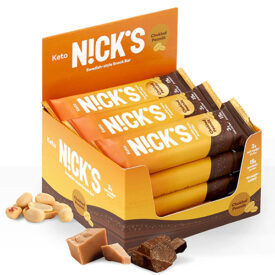
If you’re craving a candy-style bar without all the added sugar, these keto protein bars have 14 grams of protein with only four net grams of carbs and seven to 10 grams of fat.
Specs
- Price Per Bar: $1.99
- Protein Source: Milk Protein Concentrate, Whey Protein Concentrate, Hydrolyzed Casein
- Protein per Serving: 12-15 grams
- Calories per Serving: 160-190 calories
- Available Flavors: Choklad Peanot, Karamell Choklad, Kristi Nougat, Mint Chocolate, Almond Chocolate, Triple Chocolate, Premium Variety Pack
Pros
- With only four grams of net carbs and up to 10 grams of fat per bar, these are ideal for those on a keto diet.
- These have between 160 and 190 calories per bar, ideal for quick snacking between meals.
- Each bar delivers between 12 and 15 grams of protein per serving.
Cons
- The calorie count may be too low for athletes needing a meal replacement bar.
- There’s no allergen info available, but these bars do contain nuts.
Looking to limit your carbs and chow on some protein bars that are high in fat instead? If you’re following a keto diet, this protein bar can be a great option for you.
It can be tough to find a good keto protein bar, but Nick’s Keto Snack Bar takes care of business. Each bar only has four net grams of carbs, 10 grams of fat, and two grams of sugar — but the 12 to 15 grams of protein can keep you fueled up. Our team gave the formulation a 4 out of 5 here, as the higher fat content may not work for everyone.
There are no added sugars in these bars, but their full chunks of nuts and layers of texture make these protein bars feel like candy bars. Naturally, though, we advise those sensitive to nut allergens to forgo this protein bar option.
As tasty as these bars are, though, we don’t recommend them for athletes looking to replace a meal with a worthwhile protein bar. The calorie count sits between 160 and 190 depending on the flavor, which is sufficient for a snack, but not enough to substitute for a dish containing whole foods.
We liked the cost for these, too, giving this category a 5 out of 5. One bar only costs $1.99, which is way cheaper than some other options on this list.
Best Budget Protein Bar: Pure Protein Bars
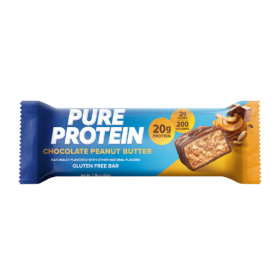
Pure Protein Bars are a budget-friendly protein bar that pack 21 grams of protein per serving, making them a perfect protein shake alternative. They're also available on Amazon Prime!
Specs
- Price Per Bar: $1.18
- Protein Source: Milk protein isolate, whey protein isolate, whey protein concentrate
- Protein per Serving: 21 grams
- Calories per Serving: 180 calories
- Available Flavors: Birthday Cake, Caramel Churro, Chewy Chocolate Chip, Chocolate Deluxe, Chocolate Mint Cookie, Chocolate Peanut Butter, Chocolate Peanut Caramel, Chocolate Salted Caramel, Cookies and Cream, Galactic Brownie, Lemon Cake, Strawberry Greek Yogurt
Pros
- At only $1.18 per bar, these are among the most budget-friendly protein bars available.
- There’s a big variety of flavor options.
- You can also buy these in 18- and 36-count boxes.
Cons
- Pure Protein uses sucralose to sweeten these bars.
- These won’t work for plant-based athletes.
For those shopping on a budget, paying more than $3 per protein bar is a pretty steep cost. But you can find high-quality protein bars for just over $1 per serving and that’s why we recommend Pure Protein Bars. At only $1.18 per bar (and available on Amazon Prime), these are a bargain. Our team gave this product a 5 out of 5 for cost.
Despite the cheaper price tag, our team enjoyed the flavor, too. “I tried the Chocolate Peanut Butter and it reminded me a lot of a candy bar,” according to our tester who gave the taste a 4 out of 5. “They are a little chalky but nothing too noticeable, which is a big plus.”
The texture was enjoyable, too. Our team compared them to a Snickers or Milky Way bar. Pure Protein Bars are chewy and rich without much dryness at all, which we enjoyed. “This is a protein bar I’d eat relatively often because I enjoyed the flavor and texture — it’s not dry like some others on the market,” one tester said.
For those wanting a pretty natural protein bar, though, these may not be the best choice. We do like the 20 grams of protein per serving, which is more than you get with more natural options. “These protein bars get the job done, but the use of sugar alcohols and its saturated fat content may be enough reason for some people to avoid them,” Chelsea Rae Bourgeois, RDN, says, giving the formula a 3.5 out of 5. rating.
Best Low-Carb Protein Bar: EPIC Bars
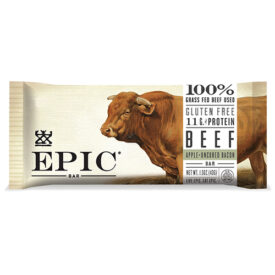
This natural meat-based protein bar is perfect for dieters who want to avoid carbs and lean into fats. Depending on the flavor you choose, they pack around 130 calories per bar, and between seven and 13 grams of protein, five to 13 grams of fat, and one and eight grams of carbs.
Specs
- Price Per Bar: $2.77
- Protein Source: Meat-based
- Protein per Serving: 7-11 grams
- Calories per Serving: 70-170 calories
- Available Flavors: Bison with Beef + Sea Salt + Pepper, Bison Bacon Cranberry, Venison Sea Salt Pepper, Chicken Sriracha, Beef Apple Bacon, Uncured Bacon + Pork, Beef Sea Salt + Pepper, Beef Jalapeño, Beef Barbacoa-Inspired, Chicken BBQ Seasoned, Variety Pack, Keto Friendly Variety Pack
Pros
- These bars only have between one and eight grams of carbs.
- Unlike most bars, these are meat-based, much like jerky.
- These bars have low sugar content.
Cons
- These are completely animal-based, which may not align with certain diet plans.
- There are more cost-friendly protein bars out there.
- The seven to 13 grams of protein per serving may be low for athletes in a bulking phase.
There are not too many true low-carb protein bars on the market. Most protein bars will have higher fiber content with minimal carbs, which will be promoted as a lower net carb content. Although, with respect to true carb minimalism, few bars truly accomplish this. At a meager one to three carbs per bar, EPIC Bars are the perfect fit for the best low-carb protein bar.
You can buy bars made from a variety of meat sources, including pig, chicken, beef and bison. They are Whole-30, Keto-approved and are free of GMOs. Depending on the flavor you choose, they pack between seven and 13 grams of protein, five to 13 grams of fat, and one and eight grams of carbs. They also have minimal added ingredients and zero nitrates or nitrites added, earning the formula a 4.5 out of 5.
I’m personally a huge fan of the bison bars. These have some dried cranberries in the bar, which adds some moisture. The berries also add to the overall flavor, which I’d give a 4 out of 5. I’ve also tried the venison, which I found to be a little drier and less appetizing overall.
As far as texture is concerned, I rate these bars a 4.5 out of 5. They feel a lot like beef jerky but they aren’t too chewy. I don’t think the bison bars are very dry at all but that wasn’t really the case with the venison. That being said, venison is known for being a very lean protein, so the dryness makes sense.
Naturally, the animal-based makeup of these treats doesn’t align with certain diets. We wouldn’t recommend these bars for athletes that are plant-based in their nutrition (we have other recommendations for those needs). Still, if you’re looking to mix things up and want a unique flavor to compliment your daily nutrition, consider EPIC’s lineup of animal-based protein snacks.
At $2.77 per bar, we gave the cost a 3.75 out of 5. They aren’t the cheapest product on the market but these bars are unique and contain clean ingredients. In my opinion, they’re definitely worth the cost.
Read our full EPIC Protein Bars Review.
The Different Types of Protein Bars
When looking at protein bars, you’re likely to find differences within each makeup. Some may contain gluten or artificial ingredients, while others contain a completely plant-based formulation. We could really get into the weeds when it comes to all the differentiators between brands and makeups, so for the sake of simplicity, let’s focus on one area that matters most in protein bars — the protein source. (11)
Animal-Based
Many of the top protein bars utilize whey as a protein source. Whey is a derivative of milk, and therefore an animal-based source of protein. It comes from the process of making cheese, and can be broken down into a concentrate. That concentrate can be broken down even further into a protein isolate, which is often considered a gold standard in protein bars and powders.
Other animal-based protein sources include meat, poultry, fish, eggs, and other dairy products. While these can be used in protein blends for certain protein bars — or even primary sources, as seen in EPIC’s lineup of meat-based bars — whey or milk-derived protein is still the most common.
Plant-Based
While dairy and animal-based protein sources are heavily represented in the protein bar category, there are other plant-based options out there that can still deliver worthwhile macro dosages.
Beans, peas, nuts, seeds, and whole grains are heavily used in plant-based protein bars — many of which we’ve included in this guide. These options can be great for athletes following strict diets, or those sensitive to dairy or other animal products.
While plant-based protein bars can be great for such nutritional needs, we do recommend paying close attention to the listed calories in bars of this type. Nuts, for example, can be rich in protein and fat, but tend to be more calorie dense than other options. (12)
The Benefits of Protein Bars
Protein bars can be worthwhile alternatives to protein shakes and whole foods every now and again, giving your palette a nice mix-up while still delivering hearty helpings of vital macronutrients. Below are some of the benefits that can come with adding these tasty treats to your repertoire.
Additional Protein Intake
Whether you’re looking to gain muscle, decrease body fat, or both, studies suggest that focusing on protein intake can help. According to a 2020 study, getting a lot of protein in your diet can help increase muscle mass and decrease body fat. (1) So, finding the right protein bar for you can potentially help you achieve any aesthetic goals you might have while maintaining your energy levels.
Boosted Post-Workout Recovery
Protein bars can also come in handy when you’re training extra hard. A 2018 study found that a diet high in protein can help improve your muscles’ recovery after a hard training session. (2) So whether you’re thinking about your long term goals (muscle gain, for example) or short term gain (improving recovery), protein bars might be helpful.
Convenience
Plus, protein bars can be a convenient and healthy snack to have on hand. Even if you aren’t trying to meet any particular fitness goals, it can be better for your long term health to reach for a protein bar rather than a candy bar when your sweet tooth hits.
Calculating Your Protein
Protein is the building block of the muscle and is responsible for muscle gain (if you’re in a caloric surplus) or muscle retention (if you’re in a caloric deficit). (11) According to Harvard Health, the recommended dietary intake for protein is 0.8 grams of protein per kilogram of body weight, or 0.36 grams per pound. (14) Rather than breaking out the calculator to confirm your daily servings, use our protein intake calculator to figure out how much you need.
Protein Intake Calculator
What To Consider When Buying Protein Bars
Okay, so finding the ideal protein bar for your nutritional needs may seem like a daunting task with all the options and formulations available. It doesn’t need to be a complicated matter, though, if you keep the following factors in mind when searching through the available snacks on the market.
Training Goals
When you’re thinking about investing in protein bars, you want to consider your training goals and how you want your supplements to fuel your progress. In the gym, are you mostly training right now to build muscle? To lose weight? Regardless, you’ll want a protein bar that matches what you’re putting your body through during workouts. Check to see whether the bar you’re interested in is on the upper or lower end of the protein bar calorie range, typically between 150 and 300 calories.
Eating Habits
Which protein bar is right for you also depends on your eating habits throughout the day. Do you tend to be on the run after your workout? You may need a bar that’s higher in protein to make sure you are properly refueling post-workout. Or, maybe, you just want a protein bar to keep in your bag to stave off hunger between meals. In that case, it might be less about total protein levels and more about something that’s going to taste good.
In the end, be sure to look for a protein bar that compliments your regular intake rather than throws your nutrition out of whack. The best nutrition plan is one containing plenty of whole foods and dishes, therefore your protein bars should act as accessory pieces instead of the leading roles.
Dietary Needs
Thinking about what your body and mind need from your food is also of primary importance. If you don’t want to count calories, try to check out the ingredients instead. Do you want something with pure cane sugar or sweeteners like honey? Maybe it’s most important to you that your protein bar be as unprocessed as possible and free of any artificial ingredients.
You’ll also need to think about your specific dietary needs and restrictions when deciding on a protein bar. If you follow a diet such as keto, Paleo, veganism, or others, be sure to look and see if your protein bar’s formulation fits within your guidelines.
Flavor
Of course, you’re going to find more enjoyment and positivity with your protein bar selection if the flavor pleases your palette. Make sure your protein bar offers an enticing taste that you’d likely enjoy on a regular basis. It can also be helpful to go with a bar offering multiple flavors. This can give you some leeway down the road if you begin to suffer some flavor fatigue. The additional flavor variety can be helpful in keeping your formulations relatively the same while still making for a tasty treat.
Price
Finally, protein bars are a nice snack to have on hand, but they shouldn’t be a major detriment to your daily budget. Most bars will range in prices from roughly $1.50 to $3.50, so be sure you can afford your daily treat before opting for a specific profile.
If you’re really intrigued by a more expensive protein bar, consider saving that specific formulation for special occasions. This can be a good way to motivate yourself in training while also keeping your needs satisfied with a worthwhile snack.
Final Word
If you’re looking to add an extra source of protein — and flavor — to your meal plans, the protein bars on this list should do the trick. Whether you’re in a cutting phase, trying to bulk up, are vegan, or love animal meat more than any other type of food, there’s a protein bar out there for you.
When you’re selecting a protein bar, think about your training goals, the ways you like to eat, and the tastes that make you smile. You’re sure to find an option to suit your needs on this list — and then all you have to do is toss a bar in your gym bag and enjoy.
FAQs
Are protein bars good for you?
Yes and no. Protein bars with a lot of sugar content are not really healthy and there are likely better options for foods to consume. However, if someone is in a bind or traveling, and they’re an option compared to something like a candy bar, then there’s an argument to be made that they are healthier in comparison.
Are protein bars good for weight loss?
It depends. Protein bars can be used as tools to aid with long-term weight loss in the greater scope of one’s diet, but protein bars alone are not inherently magic or overly healthy compared to natural, nutrient-dense foods.
What is the best protein bar?
The best protein bar is subjective, as every athlete has different nutritional needs and varying flavor preferences. For our money, though, we recommend Transparent Labs Protein+ Bar.
Can kids eat protein bars?
Protein bars can be a healthy snack for just about anyone, kids included. However, it’s important to make sure to double check that the bars you choose don’t conflict with any of your children’s pre-existing allergies or health conditions. Protein bars aren’t a sufficient meal replacement, either.
Do protein bars make you gain weight?
Any food can contribute to weight gain if you’re eating more calories than you’re burning, though some are less likely than others due to caloric density. You’re much less likely to gain weight by eating apples and broccoli than chips and pizza because of the difference in calorie density. Similarly, protein bars tend to be pretty lean because a lot of people use them as snacks to help potentially lose weight.
When Should You Eat Protein Bars?
There’s no best time to consume your protein — the best time is when it’s most convenient for you. That said, your workout schedule might prevent you from being able to eat a full meal within a few hours of training. Or, you might just like having a protein bar on hand — especially if you travel around a lot during the day, or train early in the morning on an empty stomach.
References
- Antonio, J., Candow, D. G., Forbes, S. C., Ormsbee, M. J., Saracino, P. G., & Roberts, J. (2020). Effects of dietary protein on body composition in exercising individuals. Nutrients, 12(6), 1890.
- Davies, R. W., Carson, B. P., & Jakeman, P. M. (2018). The effect of whey protein supplementation on the temporal recovery of muscle function following resistance training: A systematic review and meta-analysis. Nutrients, 10(2), 221.
- Arent SM, Cintineo HP, McFadden BA, Chandler AJ, Arent MA. Nutrient Timing: A Garage Door of Opportunity? Nutrients. 2020 Jun 30;12(7):1948. doi: 10.3390/nu12071948. PMID: 32629950; PMCID: PMC7400240.
- Williams, G., Noakes, M., Keogh, J., Foster, P., & Clifton, P. (2006). High protein high fibre snack bars reduce food intake and improve short term glucose and insulin profiles compared with high fat snack bars. Asia Pacific journal of clinical nutrition. https://pubmed.ncbi.nlm.nih.gov/17077058/
- Traylor, D. A., Kamal, M., Nunes, E. A., Prior, T., Gorissen, S. H., Lees, M., Gesel, F., Lim, C., & Phillips, S. M. (2021). Consumption of high-leucine-containing protein bar following breakfast impacts aminoacidemia and subjective appetite in older persons. Current Developments in Nutrition, 5(6).
- Wu, G. (2016). Dietary protein intake and human health. Food & Function, 7(3), 1251–1265.
- McKeown, N. M., Fahey, G. C., Slavin, J., & van der Kamp, J.-W. (2022). Fibre intake for Optimal Health: How can healthcare professionals support people to reach dietary recommendations? BMJ.
- Wunsch, N.-G. (2020, November 25). U.S. candy and chocolate average price by segment 2019 L statistic. Statista. https://www.statista.com/statistics/643582/average-unit-price-candy-and-chocolate-us-by-segment/
- Kim, J. Y. (2021). Optimal Diet Strategies for weight loss and weight loss maintenance. Journal of Obesity & Metabolic Syndrome, 30(1), 20–31.
- Collier, G., McLean, A., & O’Dea, K. (1984). Effect of co-ingestion of fat on the metabolic responses to slowly and rapidly absorbed carbohydrates. Diabetologia, 26(1).
- Protein. The Nutrition Source. (2023, October 19). https://www.hsph.harvard.edu/nutritionsource/what-should-you-eat/protein/
- De Souza, R., Schincaglia, R., Pimentel, G., & Mota, J. (2017). Nuts and human health outcomes: A systematic review. Nutrients, 9(12), 1311.
- Sousa, R., Portmann, R., Dubois, S., Recio, I., & Egger, L. (2020). Protein digestion of different protein sources using the INFOGEST static digestion model. Food Research International, 130, 108996.
- How much protein do you need every day?. Harvard Health. (2023, June 22). https://www.health.harvard.edu/blog/how-much-protein-do-you-need-every-day-201506188096
